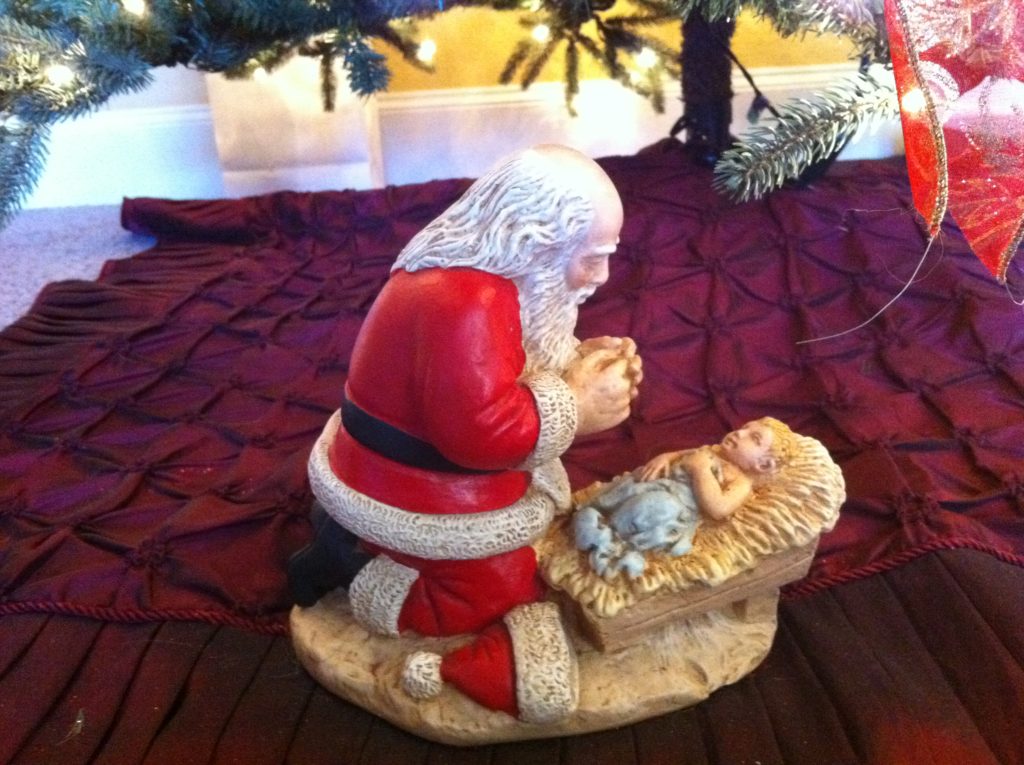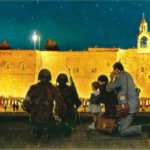Observations: Inherently Religious
Tis the season: Christmas specials, movies, performances, novels, homework assignments (nothing is sacred), debates on the use of holiday (re: holy day) v. the use of Christmas, Salvation Army employees outside stores, and open season at the mall.
Yeah…I’m not a mall person. I am a Christmas person. Jesus and I were born only 2000 years and two days apart. Ha. 0=) I like the entire holiday season and all the insanity that goes with it. For real. I’ve a list of favored movies and books, and they must be acknowledged frequently. Mom starts playing Christmas tunes around September.
And before you read any further, this post is most definitely not about materialism/consumerism. That’s its own beast. So that’s not where I’m going. I like Santa. I like presents. I like reindeer and I like Jingle Bell Rock and Silver Bells.
At any rate, of late I’ve developed a bit of an aversion to particular aspects of Christmas without really knowing why. It took the movie Elf to clarify the problem for me. For some reason, I’ve never really gotten on the Elf bandwagon.
I’m not really one of those people who thinks we should not buy Christmas presents, decorate the house, or catch sales (hey, if you’re gonna spend money, spend smart), or thinks we should only play “religious music.”
I am, however, a stickler on keeping the spirit of the whole thing.
Most people understand the basic spirit of Christmas: Hope.
But…hope in what?
Glory to…Whom?
It’s here that the whole thing gets weird. Most movies involving Santa at all make Santa into almost a divine figure. Santa is the god of the holiday season–from Thanksgiving to New Year’s. It’s immediately after the Hallowed Eve of Candy. But check this out:
–Elf: Buddy practically worships Santa. In fact, the world depends on faith in Santa. The evil Central Park Rangers, in true Ringwraith fashion, are devilish.
–The Santa Clause: An odd combination of humans becoming the godlike Santa Clause.
–Miracle on 34th Street: Santa can make dreams come true, including matchmaking and baby-bringing. In the new one, anyway. I don’t remember if the line is in the old one.
Anyway. I could name more, where, in their intended spirit of making a statement in favor of keeping “the reason for the season.” Hope. Magic. Miracles. Honestly, in the end they’re more about hope in man or in the Santa deity. Even my beloved Muppet Christmas Carol, I think.
With whom God has found favor
And like I said. I like a good number of the movies on the list. But I expect Hanukah to be inherently religious for Jews, and I expect Ramadan to be inherently religious for Muslims. So, yes, when we strip away all the bright, pretty things…I expect a clear statement of “Hope in God.” You know, the Messiah. The Anointed One, the Creator of the universe bundled in human flesh, born that man no more may die; born to raise the sons of earth; born to give them second birth.
The fickle, karma-based Saint Nick just doesn’t do it for me. He’s fun, no doubt. But he can’t offer hope. He can’t offer the peace and favor of God. And he certainly can’t bring salvation.
Charms, Tokens, and Other Symbology
I know, I know: What the blazes does this have to do with speculative fiction? I’m going to completely steal an answer from Karen Hancock regarding Elhenu in her book Arena: He is the god of the Arena. And in that vein, I’ll say that Santa is the god of those particular stories.
There was this book I was reading for review, and it’s honestly the only book I’ve ever read that so totally offended and manhandled the reader that I had to decline to review it. On a religious level, I hated it. On a professional, writer’s level, I hated it. ( No, I’m not disclosing the title.) To mention it brings bile to my mouth and a series of absolutely disgusting images. I mention it now only to make this point: You can abuse symbolism.
This book, for all purposes, was inherently religious. I didn’t read The DaVinci Code, but it seemed about that level: Agree or not, accurate or not, the symbols and extra-biblical material require a serious treatment of the particular religion (no, it wasn’t Christian). The problem is, from what I could tell, it was done with a severe atheist or agnostic bent and winds up mocking everything that should be serious about it (despite the entire plot hinging on religious tradition). It’d be like making National Treasure in such a way that the movie wound up being anti-American and mocked everything about American culture.
One of my fellow reviewers put it this way: “Dan Brown would have gotten it wrong, but he’d have respected the symbolism.” This particular writer…did not.
And so we’re back to Christmas. Christmas, in name, tradition, and essence, is Christian. (No, I really don’t care if you call it a Christmas tree or a Holiday tree. Stick to the point.) And no, I don’t think we should only play the “religious” Christmas songs (although I tend to like them better) or watch The Santa Clause. I will probably watch a plethora of Christmas movies before this season is over. Not the point.
I just think that, maybe, in our endeavor to not appear “preachy” we shouldn’t sacrifice the inherent nature of the thing we hope in. I know most of us can keep Santa and Jesus separate in our heads – but it’s because we understand that the star in the east and the jingle of sleigh bells are completely different symbols and point to two very different people.
To Raise the Sons of Earth
So when we talk about hope, remember Santa can’t offer it. When we talk about redemption, Neo can’t bring it. When we talk about righting the universe, Luke can’t do it alone. Characters can be dead wrong in their beliefs, and that’s fine. I have one who thinks if he sins he will die and God will reject him; I have another who thinks God works on a karma system. I have another who thinks God abandoned him.
And that’s my thought, I suppose. Whatever symbol you use, use it wisely. If a story centers around a religious ritual, ceremony, or principle, then don’t castrate it. Don’t abuse it or change it or mock it, because you’re mocking the very thing you need to make the story work.
And Christmas is about the birth of Christ and the beginnings of the Invasion of Heaven. It’s about God declaring peace and his good will and favor toward man.
Not how wonderfully sentimental we mortals are, or how jolly a holiday deity is.











































You’ve said it very well! I’ve noticed this “Santa-God” attitude in the Chrismas specials on TV. It takes the joy and wonder out of Christmas to watch people depending on a glorified human (’cause no one has ever pretended [to my knowledge] that Santa is truly a deity).
I like what Tolkien did in his Father Christmas Letters. He painted a picture of Santa that is perfectly acceptable–a sometimes grumpy old man who works hard, who cares for children’s Chrismases, who dearly loves his friends but who gets stressed out when they misbehave! Tolkien didn’t make Santa (or Father Christmas) godlike.
Now on a different note, I absolutely love the Muppet Christmas Carol too!
Hehe. Yeah, I know people don’t consciously do it. But the attitudes and the way they say things would be considered quite exalting in any other context. Take Elf. Replace Santa with Jesus and call Buddy…I dunno, John the Baptist, and you have a quite different story.
I haven’t read the Father Christmas Letters. They sound intriguing. 0=)
As far as my knowledge, either, no one has ever seriously pretended that Santa is a deity. (Though in my opinion he’s the modern equivalent of some of the lesser members of the Roman pantheon—someone that everyone pretends exists, that it is part of the civic religion to pray to and otherwise venerate, but who those “in the know” know doesn’t really exist. And that last is intended as a stepping stone: “if Santa doesn’t exist, then …”) But L. Frank Baum (the author of The Wizard of Oz and the first set of sequels) wrote a novel detailing his origins, in which he becomes divine (or Immortal, which is as far as the book goes with anything) by agreement of all the other Immortals. It’s a quite enjoyable book, which I enjoyed very much as a child, but I’m somewhat worried about its implications now that I think of it.
Oh, right. I know. I was mostly gleaning from terminology used in various movies. (Example: My context-use of the phrase ‘give glory’ is such that I can’t fathom using the word in any other context except in reference to God himself. That meant I refused to sing my own college alma mater. It was strictly a personal thing with me, but it’s virtually the same perception.)
I’ll have to check into the book.
Addendum: And thanks for the cross-reference with the Pantheon. I hadn’t thought of that. Then, I’ve been reading Hinduism lately.
[…] This post was mentioned on Twitter by Kaci, Speculative Faith. Speculative Faith said: Mistreating Santa or other religious symbols misses their true meanings, @KaciHill argues on #SpecFaith: http://bit.ly/eZxWFS […]
Once in my Sunday school class, to the question “Who do we pray to?” a child (from a Christian family) replied “Santa” :-O
Bad-dum ching!
“The fickle, karma-based Saint Nick just doesn’t do it for me.”
🙂
I have Hindu friends (from Bhutan-Nepal) and one of them was under the impression that we, in America, worship Santa Clause along with Jesus. And I replied that we (in America) worship neither. But Christians worship Jesus.
Anyway, I liked this because when he asked me that question I was thinking, “But why would anyone want to worship Santa, he is all about karma?” And then I realized they, my Hindu friends, worship Santa.
Elfish slavery.
So I guess we Americans do worship Santa too. But Christians worship Jesus.
Shoot, here’s to hoping that this Christmas many elves will be set free from slavery. To know the love of God in Yeshua.
Wow! Honestly, I’ve been doing a personal study on Hinduism, which is partly responsible for the connection in my mind. Thanks so much.
Amen to that.
Santa is a means of getting rid of Jesus. Substitution. There are people for whom this is a desirable objective.
In Australia we have just had a bureaucrat issue a memo that nativity scenes not be permitted in Centrelink or Medicare offices. The minister was quickly in front of the TV cameras saying that this ban would not stand, and the staffer (the grinch) found and counselled.
Homework assignments? Now that would be really weird, considering that the schools have just broken up for summer holidays.
And a merry Christmas to all!
Ha. Sorry. I forgot that for the southern hemisphere it’s summer.
I think this song “My Grown Up Christmas List” proves your point very well. Every music artist seems to be singing this these days, even the Christian ones. The melody is so nice that we probably pay no attention to the lyrics but when we do it’s quite offensive. This is basically a prayer to Santa. And not one that lines up with Scripture either. (Yes, one day there will be no more pain but not until Jesus’ return and the new Heaven and Earth are aet-up). I posted the lyrics in case you are unaware of them. Good article Kaci. Thanks and Merry Christmas
Do you remember me
I sat upon your knee
I wrote to you
With childhood fantasies
Well, I’m all grown up now
And still need help somehow
I’m not a child
But my heart still can dream
So here’s my lifelong wish
My grown up christmas list
Not for myself
But for a world in need
No more lives torn apart
That wars would never start
and wars would never start
And time would heal all hearts
And everyone would have a friend
And right would always win
And love would never end
This is my grown up christmas list
As children we believed
The grandest sight to see
Was something lovely
Wrapped beneath our tree
Well heaven only knows
That packages and bows
Can never heal
A hurting human soul
No more lives torn apart
That wars would never start
And time would heal all hearts
And everyone would have a friend
And right would always win
And love would never end
This is my grown up christmas list
What is this illusion called the innocence of youth
Maybe only in our blind belief can we ever find the truth
(there’d be)
No more lives torn apart
That wars would never start
And time would heal all hearts
And everyone would have a friend
And right would always win
And love would never end, oh
This is my grown up christmas list
This is my grown up christmas list
I have always loathed this song — like a holiday-ized version of “Imagine” and just as humanistic. Not only that, but its sentimentality leads to bizarre contradictions, such as “that wars would never start” but at same time “right would always win.” Kind of hard to win if wars will never start.
Amen times ten, Steve. That’s why songs pining for “world peace” and whatnot, but without Jesus, are no better than all those wars and friendlessness and other sins.
Steve – You know, that was one I liked growing up, but as a kid you don’t think about it. I know that one very, very well. But yeah – definitely changes perspective once you see the words. Thanks.
We need to look at the deeper meaning of the Santa Claus. It is a realtively recent invention. There is always a reason why these monsters crop up in popular culture. They express something. The wolf man expresses our fear of uncontrollable violence. The vampire (as Dracula) expresses our fear of seduction. Zombie stories came to prominence at the same time as mobile phones became widespead and masses of people walked around our cities using them.
The Santa Claus arises as a consequence of the triunph of production. Our culture promises us that we are all going to get lots of stuff. We will have so much stuff that small aliens can hid in it. And not particularly because we created it ourselves or even earned it. Someone is just going to give it to us.
We may overlook that other monster that arose at a similar time. With no name of its own, the Monster (by Frankenstein) represents our fear of what might happen as a result of our creative tinkiner in the world. Perhaps we are not as smart as we think we are. We will make things that will come back at us in ways we can’t predict.
That suggests a new movie plot: Santa versus Monster. I wonder who would win?
[…] the interest of a prelude, before Christmas I wrote a piece called Inherently Religious, in which I argued that some events and symbolism are by nature religious, and, therefore, […]
[…] for reference, this is a bit of a throw-back to Inherently Religious (Some things are sacred by default, no matter our efforts to ‘secularize’ them) and […]